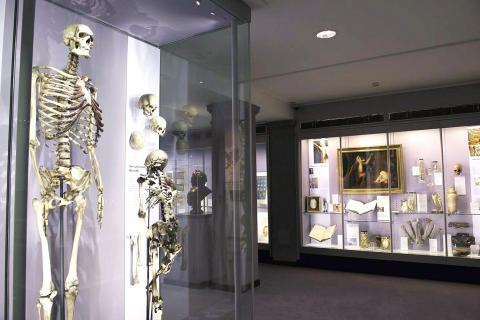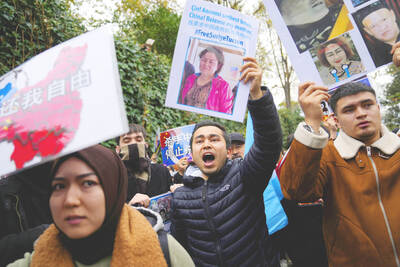The skeleton of an 18th-century celebrity nicknamed the “Irish Giant” should be removed from a museum and buried at sea in keeping with his last wishes, two experts have argued.
Writing in the British Medical Journal, medical ethicist Len Doyal and legal researcher Thomas Muinzer said there is no good scientific reason to display the skeleton of Charles Byrne, who died in 1783.
“What has been done cannot be undone but it can be morally rectified,” the two men wrote. “Surely it is time to respect the memory and reputation of Byrne.”

Photo: AFP
照片:法新社
Byrne stood about 2.3 meters tall as a result of acromegaly, or an excess of growth hormone. He became a celebrity in 18th-century London as the main attraction in a museum of curiosities, but died aged just 22.
Despite Byrne’s wish to be buried at sea, his body was purchased by pioneering surgeon and anatomist John Hunter, who often hired grave robbers to supply him with corpses. For two centuries Byrne’s skeleton has been on display at the Royal College of Surgeons’ Hunterian Museum in London.
Doyal, of London’s Queen Mary University, and Muinzer, of Queen’s University Belfast, said that while Byrne’s skeleton had been of use to medical research, that was no reason to put it on public display. “Moreover, now that Byrne’s DNA has been extracted, it can be used in further research,” they wrote.
(AP)
兩位專家建議將十八世紀一名綽號為「愛爾蘭巨人」的骨骼移出博物館,並遵照其遺願將之海葬。
在發表於《英國醫學期刊》的文章中,醫學倫理學家萊恩‧多亞爾與法學研究者湯瑪斯‧穆澤指出,沒有科學上的好理由來展示查爾斯‧拜恩的骨骼;他歿於一七八三年。
「做過的事無法抹滅,但在道德上是可以被改正的」,兩人寫道,「無疑地,是表現對拜恩的懷念與名聲尊重的時候了。」
由於罹患生長荷爾蒙分泌過多的肢端肥大症,拜恩約二點三米高。他在十八世紀的倫敦,因是珍奇博物館中最吸睛的焦點而成為名人,不過他年方二十二歲就死亡。
儘管拜恩的願望是海葬,但他的遺體卻被外科醫師先驅兼解剖學家約翰‧杭特購得,杭特常雇用盜墓者為他供應屍體。兩個世紀來,拜恩的骨骼展示在倫敦皇家外科醫師學院的杭特博物館。
倫敦大學瑪莉皇后學院的多亞爾,與貝爾發斯特女王大學的穆澤說,儘管拜恩的骨骼被用於醫學研究,不過沒有理由公開展示它。他們寫道,「再者,現在已抽取拜恩的DNA,可用於更進一步的研究。」
(美聯社/翻譯:魏國金)

Oxford University Press (OUP) will no longer publish a controversial academic journal sponsored by China’s Ministry of Justice after years of concerns that several papers in the publication did not meet ethical standards about DNA collection. A statement published on the Web site of Forensic Sciences Research (FSR) states that OUP will stop publishing the quarterly journal after this year. FSR is a journal that comes from China’s Academy of Forensic Science, an agency that sits under the Ministry of Justice. The academy describes FSR as “the only English quarterly journal in the field of forensic science in China that focuses on

A recent medical malpractice case involving a physician trained abroad has once again placed BoBo Doctors under public scrutiny. This incident has revived concerns about the quality of healthcare in Taiwan and highlighted ongoing debates regarding the legitimacy and impact of these doctors in the medical field. The term “BoBo Doctors” refers to Taiwanese students who fail to gain entry into domestic medical programs and instead pursue medical degrees in countries like Poland and other Eastern European nations. Not until they return to Taiwan do they attempt to qualify as practicing doctors by relying on their foreign qualifications to

A: A number of high-profile films are being released this summer movie season. B: I just went to see Superman and visited the Superman-themed DC pop-up store. A: F1, Jurassic World: Rebirth and The Fantastic Four: First Steps are also popular. B: Adapted from a fantasy novel, South Korean blockbuster Omniscient Reader Viewpoint — starring Lee Min-ho, Paul Ahn and Blackpink member Jisoo — is also highly anticipated. A: Let’s not forget that the Taiwanese film Gatao – Big Brothers, the newest of the Gatao series, is set to open next month. A: 今年暑期檔強片真不少! B: 我最近才剛看了《超人》,還去了超人主題「DC快閃店」。 A: 《F1》、《侏羅紀世界:重生》、《驚奇4超人:第一步》……等巨片也都大受歡迎。 B:

Dos & Don’ts — 想想看,這句話英語該怎麼說? 1. 她變了很多,我幾乎認不得她。 ˇ She has changed so much that I can hardly/scarcely recognize her. χ She has changed so much that I almost cannot recognize her. 註:almost 可以修飾 no, none, nothing。但不可修飾 not,或給 not 修飾。例如: You’ve made almost no mistakes. There is almost nothing left. Almost none is left. 不可以說 almost not 或 not almost。 「幾乎不」應用 hardly, scarcely 表達。請參考下列句子: I could hardly stand.(我幾乎站不住了。) I could hardly see anything in the swirling snow.(在漫天大雪中我幾乎什麼都看不見。) 2. 我們應永遠銘記老師的臨別贈言。 ˇ We shall never forget our teacher’s parting advice. ˇ We shall always remember our teacher’s parting advice. χ We shall always not forget our teacher’s parting advice. χ We shall forever